Muuto’s Loft chair, designed by Thomas Bentzen in 2017, features a straight, lacquered steel frame with a seat and back made of bent veneer. The Loft chair is a playful junction of opposite elements, where soft and sharp shapes collide, and warm and cold materials meet. The result is a clear and refined design with a unique edge, making Loft a popular chair by dining tables at home as well as in cafés, restaurants, meeting rooms, and other public spaces. Loft chairs are available in several different combinations of coatings and wood surfaces.
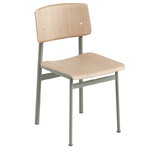
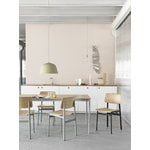
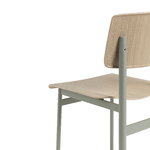
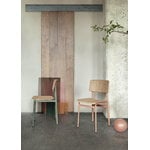
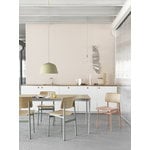
Loft chair, dusty green - oak
Muuto
Description
Muuto’s Loft chair, designed by Thomas Bentzen in 2017, features a straight, lacquered steel frame with a seat and back made of bent veneer. The Loft chair is a playful junction of opposite elements, where soft and sharp shapes collide, and warm and cold materials meet. The result is a clear and refined design with a unique edge, making Loft a popular chair by dining tables at home as well as in cafés, restaurants, meeting rooms, and other public spaces. Loft chairs are available in several different combinations of coatings and wood surfaces.
Product details (7)
- Colour
- Dusty green, oak
- Width
- 42.5 cm
- Depth
- 48 cm
- Height
- 78.5 cm
- Seat height
- 46 cm
- Frame material
- Powder coated steel
- Seat material
- Veneer with beech core and oak top
- Product ID
Designer
Thomas Bentzen is a Danish designer who graduated from the Copenhagen Design School in 2003. Bentzen founded his own design office in 2010 and is also part of the Copenhagen REMOVE design group. Before setting up his own office, Bentzen worked for five years at Danish firm Louise Campbell.
Bentzen has worked in various fields of design, ranging from tableware to interior design and from furniture to industrial design. His designs are often characterized by a clear, playful and graphic touch, with an aim to test the boundaries of different materials within the boundaries of form, functionality and sustainable design. Bentzen’s designs have been seen in numerous exhibitions around the world, and he has worked with brands such as Louis Poulsen, Hay and Muuto.
View all productsReviews (0)
Sustainability
The Product Sustainability Framework, our criteria of sustainable design, helps you find the most sustainable products in our selection. Read below which sustainability criteria this product has met.
Working conditions & labour 7/9
-
Equal opportunities for all employees
-
Commitment to UN Global Compact, fair compensation for all employees
-
Corporate responsibility requirements defined and communicated for suppliers
-
Systematic work for improved inclusion and well-being in the workplace
-
Transparent supply chain
-
Suppliers' compliance to a code of conduct ensured
-
Compliance to the UN Guiding Principles on Business and Human Rights ensured in the supply chain
-
Direct suppliers audited and certified
-
Support for community involvement in the supply chain
Eco-friendly production 9/9
-
Fair and resource-wise water-use in production
-
No incineration or landfilling of returned items
-
No use of endangered species as materials
-
No direct environmental emissions or waste (excl. GHGs) from production
-
The sustainability of direct suppliers' production is addressed and monitored
-
Production and material sourcing that respect biodiversity, animal rights, and natural ecosystems
-
Material-efficient and ecological packaging
-
Positive impact on nature’s well-being through operations that regenerate natural ecosystems
-
No potentially harmful chemicals used in own production
Climate impact 4/8
-
Company's direct greenhouse gas emissions identified and commitment to reduction
-
Product's carbon impact identified and commitment to reduction
-
Guidance on energy- and eco-efficient use of the product
-
Contribution to climate initiatives beyond the brand’s direct operations
-
Low-carbon or compensated transportation
-
Carbon footprint of the product calculated and goals set to reduce it
-
100 % renewable energy in own production and operations
-
Carbon neutral or carbon negative product
Sustainable materials 3/6
-
Sustainable and long-lasting material choices
-
No harmful or hazardous substances
-
Responsible raw material sourcing and production
-
Materials suited for circularity: monomaterials, recyclable finishings, renewable or recycled contents etc.
-
Ecological materials: natural, biodegradable, recyclable or recycled contents
-
Outstanding materials in terms of innovativeness, responsibility, sustainability and circularity: local production or sourcing, 100 % recycled content, C2C-certification etc.
Circular design 4/5
-
High aesthetic quality promoting long-term use of the product
-
Technically durable product design and material choices
-
Design for enduring life-long quality
-
Design and support for product maintenance, repair and upgradability
-
Innovative circular design solutions: circular service system, resale platform, remanufacturing, collection of used products, etc.








